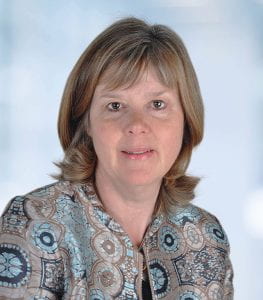By Professor Judith Squires, Deputy Vice-Chancellor and Provost
 After two years of online celebrations, I was exceptionally proud to join colleagues in person last month for a Provost Celebration of Academic Achievement. We were celebrating the major £10m funding success of the Economic and Social Research Council (ESRC) Centre for Sociodigital Futures, led by the University of Bristol.
After two years of online celebrations, I was exceptionally proud to join colleagues in person last month for a Provost Celebration of Academic Achievement. We were celebrating the major £10m funding success of the Economic and Social Research Council (ESRC) Centre for Sociodigital Futures, led by the University of Bristol.
The Bristol-led Centre for Sociodigital Futures has an ambitious research agenda, focussing on the intersections of digital technologies and social practices, and what might be done to drive these towards fair and sustainable ways of life.
Its aim, as described by its Co-Directors, Professors Susan Halford and Dale Southerton, is to “investigate these sociodigital futures in the making across diverse domains of social life and different areas of digital innovation to explore where it might be possible to tip the balance towards inclusive, reflexive and sustainable trajectories.”
How do our sociodigital futures take shape?
Digital technologies are transforming everyday life and bold claims are being made about how intelligent robots, autonomous vehicles and the ‘metaverse’ will shape our futures. These claims are important because they drive corporate investments, government policies and business strategies, and they inform our hopes and fears for daily life. Yet we know from the past that futures claimed rarely turn out as predicted.
The interplay of digital technologies with the complex realities of everyday life produces multiple and unexpected outcomes, with far reaching implications for the economy, politics and social life. And, amidst the COVID-19 pandemic, climate crisis, and widening inequalities, what lies ahead seems more uncertain than ever.
The new Centre aims to generate new approaches to fairer and more sustainable societies; to render emerging sociodigital futures both “intelligible and actionable” with direct impact on policymaking, organisational practice, community participation and technology design.
A flagship investment and a true collaboration
The ESRC Research Centres are flagship investments, which are expected to be national and international Centres of Excellence. Only four or five centres are funded every two years, across the full range of Social Science disciplines. In this round, there were 89 original expressions of interest to the ESRC, with five bids funded.
It brings together world-leading expertise across eight schools in Social Sciences, Engineering and the Arts, and will be led from the University of Bristol. Academic partners are based at the Universities of Edinburgh, Lancaster, Birmingham, Goldsmiths University of London, and University of the Arts, London.
The centre will also work in collaboration with core strategic partners BT, Defra, Maybe, Locality, the National Cybersecurity Centre and UNESCO, and has an international partner network across five continents.
The ambitious research agenda will explore how digital devices, services and data are shaping (and being shaped by) everyday practices of consuming, caring, learning, moving (people and goods) and organising.
At the same time, the Centre will explore how cutting-edge technologies – artificial intelligence, high performance networks, robotics, and augmented/ virtual and extended reality – are imagined and innovated for a range of futures linked to these areas of practice.
The event itself showed the extent of this collaboration and we heard speeches from Professor Phil Taylor (PVC Research), Professor Simon Tormey (Dean of the Faculty of Social Sciences & Law), Professor Karla Pollmann (Dean of Arts) and Professor Ian Bond (Dean of Engineering), as well as from Susan and Dale.
We were also pleased to welcome some of our partners and raise a celebratory glass with them.
Next steps
A lot of preparation work for the Centre for Sociodigital Futures is already underway, with a planned started date of 1 May 2022. The Centre will run for an initial five years, but it is expected there will be opportunities to renew funding beyond that.
I want to pay tribute to Professors Susan Halford and Dale Southerton, and the team in our Research and Enterprise division (RED), who supported the bid development, and congratulations to everyone who contributed to this fantastic achievement.
Find out more about the ESRC Centre for Sociodigital Futures on our website.

 Today is
Today is